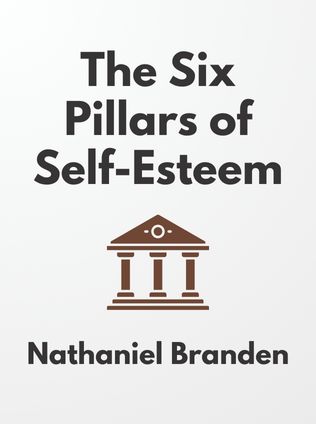
The Six Pillars of Self-Esteem
By Nathaniel Branden
Published 01/1994
About the Author
Nathaniel Branden, a prominent psychotherapist, author, and self-esteem expert, has left an indelible mark on the field of psychology through his groundbreaking work on self-esteem. He is best known for pioneering the concept that self-esteem is not merely a byproduct of success or positive outcomes but a fundamental need for psychological well-being and personal growth. Branden’s work is deeply rooted in the belief that self-esteem is a critical determinant of a person's ability to live a fulfilling and successful life. Over the course of his career, Branden authored several influential books, with The Six Pillars of Self-Esteem being the most comprehensive and widely recognized.
Branden's approach to self-esteem is both philosophical and practical. He combines rigorous analysis with actionable strategies, making his work accessible to both the general public and mental health professionals. His ideas have influenced countless individuals, helping them to understand the importance of self-esteem and providing them with the tools to cultivate it. Through his writings, seminars, and clinical practice, Branden has empowered people to take control of their lives by fostering a healthy sense of self-worth, making him one of the most influential figures in the field of self-development.
Main Idea
The central thesis of Nathaniel Branden's The Six Pillars of Self-Esteem is that self-esteem is the foundation upon which all aspects of a successful and fulfilling life are built. Branden defines self-esteem as the combination of two essential components: self-efficacy and self-respect. Self-efficacy is the belief in one's ability to think, learn, make decisions, and overcome challenges, while self-respect is the conviction that one is deserving of happiness and success. According to Branden, these two elements are intertwined, creating a dynamic cycle where each reinforces the other.
Branden argues that self-esteem is not a static trait but a dynamic process that can be cultivated through conscious effort. He introduces six pillars, or practices, that individuals can engage in to build and maintain healthy self-esteem. These pillars are: Living Consciously, Self-Acceptance, Self-Responsibility, Self-Assertiveness, Living Purposefully, and Personal Integrity. Each pillar represents a specific aspect of self-esteem and provides practical steps for individuals to strengthen their self-worth and, by extension, improve their lives.
Table of Contents
- Introduction: The Importance of Self-Esteem
- What Self-Esteem Is & Why It Matters
- How to Improve Your Self-Esteem: The Six Pillars
- Pillar 1: Living Consciously
- Pillar 2: Self-Acceptance
- Pillar 3: Self-Responsibility
- Pillar 4: Self-Assertiveness
- Pillar 5: Living Purposefully
- Pillar 6: Personal Integrity
- External Influences on Self-Esteem
- Nurturing Self-Esteem in Others
- Conclusion: The Future of Self-Esteem
Introduction: The Importance of Self-Esteem
Self-esteem is often regarded as the cornerstone of mental health and personal development. Nathaniel Branden's work highlights that self-esteem is not just a luxury or an optional attribute, but a fundamental human need. He argues that without a healthy sense of self-esteem, it is nearly impossible to achieve lasting success, happiness, or fulfillment. Self-esteem influences every aspect of our lives—from the quality of our relationships to our ability to pursue our goals and handle adversity.
Branden's exploration into self-esteem reveals that it is both an outcome and a prerequisite for personal growth. As he states:
"Self-esteem is the reputation we acquire with ourselves." — Nathaniel Branden
This profound statement underscores the idea that self-esteem is not just about how we feel in the moment, but about the long-term relationship we have with ourselves. It is about the ongoing evaluation of our worth and capabilities. Branden’s work makes it clear that self-esteem is an essential ingredient in the recipe for a successful and fulfilling life.
What Self-Esteem Is & Why It Matters
Branden defines self-esteem as the experience of being competent to cope with the basic challenges of life and being worthy of happiness. This definition encompasses two interrelated components: self-efficacy and self-respect. Self-efficacy is the belief in our ability to think, make decisions, and deal effectively with the demands of life. It is the conviction that we can understand and solve the problems we face. Self-respect, on the other hand, is the belief that we are worthy of happiness and success—that we deserve to live and to enjoy life.
These two components of self-esteem create a positive feedback loop. When we successfully navigate challenges, our sense of self-efficacy grows, which in turn reinforces our self-respect. This dynamic interplay is crucial because it means that self-esteem is both a cause and a consequence of the actions we take in life. As Branden points out:
"Self-esteem is not a free gift that one simply receives; it is earned by our actions, thoughts, and attitudes." — Nathaniel Branden
Branden emphasizes that self-esteem is inescapable; we cannot choose to have no opinion of ourselves. This self-assessment influences every decision we make, from the most trivial to the most significant. High self-esteem leads to better choices, greater resilience, and a more fulfilling life, while low self-esteem can trap us in a cycle of self-doubt, fear, and underachievement.
Branden identifies four primary reasons why self-esteem is crucial:
Sign up for FREE and get access to 1,400+ books summaries.
You May Also Like
The Subtle Art of Not Giving a F*ck
A Counterintuitive Approach to Living a Good Life
By Mark MansonRich Dad Poor Dad
What the Rich Teach Their Kids About Money - That the Poor and Middle Class Do Not!
By Robert T. KiyosakiHow To Win Friends and Influence People
The All-Time Classic Manual Of People Skills
By Dale CarnegieFreakonomics
A Rogue Economist Explores the Hidden Side of Everything
By Steven D. Levitt and Stephen J. Dubner



















